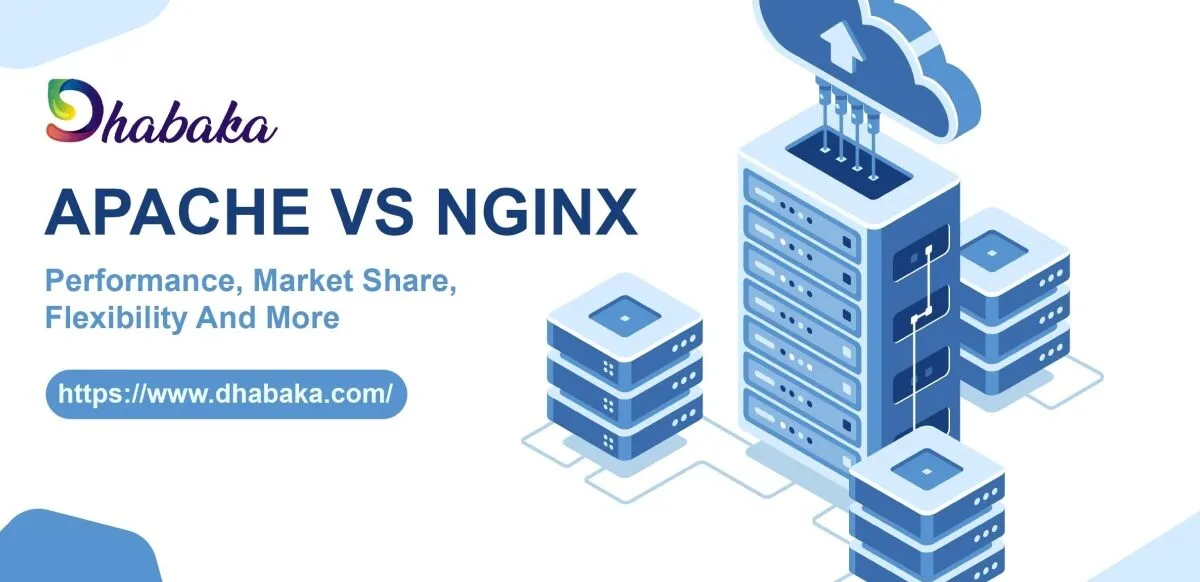
Apache vs NGINX Performance, Market Share, Flexibility and More
Hey guys, welcome back to Dhabaka.com. Today’s topic is Apache vs NGINX Performance, Market Share, Flexibility and more. I’m going to give you a complete detailed comparison between these messy competitors in the server world.
Market Share Overview
Before starting, let’s quickly go through their market share.
This will increase your interest because NGINX is competitive and has become the second-largest market shareholder after Apache, cutting approximately 35% of Apache’s share.
Market Share Graph (2007 - 2020)
- From 2007, Apache had around 53% market share.
- NGINX started gaining traction later, around 2017.
- By March 2020, the market share of NGINX is approaching Apache’s share.
Note: Microsoft used to hold top positions but is now declining due to license requirements, whereas Apache and NGINX are open-source.
Our focus will only be on Apache and NGINX and their growth.
Why Choose NGINX?
NGINX may increase your website speed. Both Apache and NGINX have advantages and disadvantages depending on your application needs.
I’ll explain the six key parameters to help you choose the right server:
- Performance
- Operating System
- Security
- Flexibility
- Documentation
- Support
If you need any help, feel free to comment below and get expert assistance.
1. Performance
Static Content
Static content includes images, JavaScript, CSS, and videos that don’t change per user.
In a 2015 survey (same hardware, 1000 concurrent requests):
- Apache handled 400 requests.
- NGINX handled 1000 requests.
This shows NGINX is around 2.5x faster, and consumes 4% less memory than Apache.
NGINX also supports reverse proxy, load balancing, and HTTP Cache, boosting performance further.
Dynamic Content
Dynamic content is generated based on user interaction (e.g., login-based personalized content).
Both Apache and NGINX perform similarly in this area when properly configured.
👉 Conclusion: Overall, NGINX wins in performance.
2. Operating System
(This section was not detailed in your input, but you can expand here if needed.)
3. Security
Both Apache and NGINX handle DDoS attacks and protocols well, so there’s no major difference.
4. Flexibility
-
Apache wins flexibility:
- Supports
.htaccessfor per-directory configuration overrides. - Allows easy module addition/removal.
- Supports
-
NGINX doesn’t support
.htaccess.- Configuration is global.
- Not ideal for shared hosting setups (e.g., GoDaddy), unless advanced solutions are implemented.
👉 Best Use Case:
- Apache: Shared hosting, multiple websites.
- NGINX: High traffic, media streaming, load balancers, VPS, or containers.
5. Documentation
- Both have strong documentation.
- NGINX leads because of official video training and certification programs.
👉 Apache: No official video training; relies on community content.
6. Support
- Both offer large communities and free support.
- For official commercial support:
- NGINX Plus offers dedicated commercial support.
- Apache relies mostly on community or third-party companies.
Summary: Which Server to Use?
| Parameter | Winner |
|---|---|
| Static Content | NGINX |
| Dynamic Content | Tie |
| Media Streaming, Load Balancing | NGINX |
| Shared Hosting & Modular Config | Apache |
| VPS / Dedicated / Containers | NGINX |
Some setups combine both:
- NGINX serves static content.
- Apache serves dynamic content.
Side-by-Side Comparison
| Apache | NGINX |
|---|---|
| Designed as a web server | Web server + Reverse proxy |
| Can’t handle heavy concurrent traffic efficiently | Processes multiple requests concurrently |
| Multi-threaded approach | Event-driven architecture |
| Modules dynamically loaded/unloaded | Modules must be compiled in core |
| Handles dynamic content natively | Needs external processor for dynamic content |
👉 Official Apache Site
👉 Official NGINX Site
Conclusion
If you need help deciding your web server setup, comment below.
If you liked this article, please comment, share, and subscribe to get the latest updates.
Thanks for reading!

